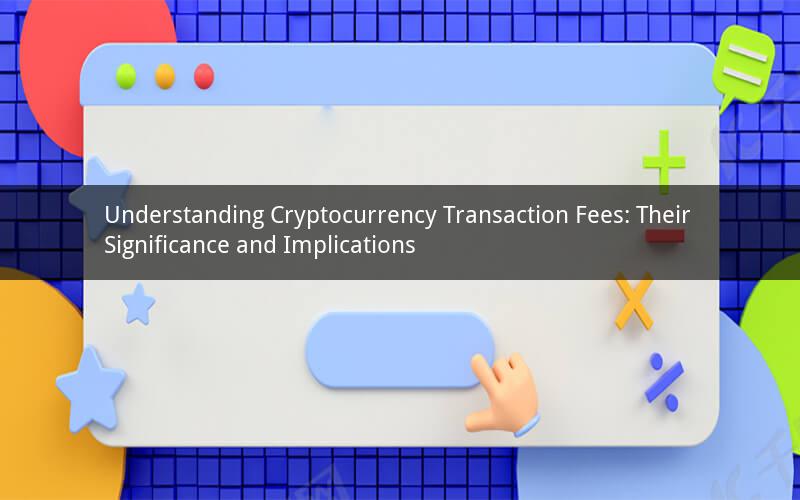
In the rapidly evolving world of digital currencies, transaction fees have become an integral part of the process. Cryptocurrency transaction fees refer to the charges imposed by a network on users for processing their transactions. This article delves into the concept of transaction fees in cryptocurrencies, their importance, and the factors influencing their cost.
Transaction fees in cryptocurrencies
Transaction fees in cryptocurrencies are the equivalent of transaction fees in traditional banking systems. When a user initiates a transaction, such as sending or receiving digital currency, the network requires a fee to process the transaction. This fee serves as an incentive for miners to validate and add the transaction to the blockchain.
The blockchain is a decentralized ledger that records all transactions in a cryptocurrency network. Miners are responsible for securing the network by validating transactions and adding them to the blockchain. In return, they receive transaction fees and newly created coins as a reward.
Importance of transaction fees
Transaction fees play a crucial role in the cryptocurrency ecosystem. Here are some of the key reasons why transaction fees are important:
1. Incentivize miners: Transaction fees provide miners with a financial incentive to validate and add transactions to the blockchain. This ensures the security and reliability of the network.
2. Control the network's growth: Transaction fees can help regulate the growth of a cryptocurrency network. Higher fees may discourage users from making unnecessary transactions, leading to a more efficient network.
3. Encourage efficient use of resources: High transaction fees can incentivize users to optimize their transactions, such as batching multiple transactions into a single transaction. This reduces the load on the network and improves its overall performance.
Factors influencing transaction fees
The cost of transaction fees in cryptocurrencies can vary widely depending on several factors:
1. Network congestion: When a cryptocurrency network experiences high levels of activity, the demand for transaction validation increases. This can lead to higher transaction fees as miners prioritize transactions with higher fees.
2. Block size and block time: The size and time it takes to add a new block to the blockchain can affect transaction fees. Larger blocks and longer block times can lead to higher fees due to increased network congestion.
3. Transaction value: The value of the transaction can influence the transaction fee. Higher-value transactions may have higher fees due to the higher priority given to these transactions by miners.
4. Cryptocurrency network: Different cryptocurrency networks have different fee structures. For instance, Bitcoin has a fixed fee per byte, while Ethereum uses a gas fee model based on the computational and storage resources required for a transaction.
5. Competition among miners: In a competitive mining landscape, miners may offer lower fees to attract more transactions. This can lead to fluctuations in transaction fees.
Common questions about cryptocurrency transaction fees
1. Q: Can I avoid transaction fees in cryptocurrencies?
A: While you cannot completely avoid transaction fees, you can minimize them by optimizing your transactions, such as batching multiple transactions into a single transaction.
2. Q: Why are Bitcoin transaction fees higher compared to other cryptocurrencies?
A: Bitcoin transaction fees are higher due to its larger network size and the fact that its block size is capped. This leads to higher competition among miners, resulting in higher fees.
3. Q: Can transaction fees be refunded if a transaction fails?
A: In most cases, transaction fees are non-refundable. However, some cryptocurrency networks may have mechanisms in place to handle failed transactions.
4. Q: How can I estimate the cost of a transaction fee?
A: You can use various online tools and fee calculators to estimate the cost of a transaction fee based on the current network conditions and your transaction value.
5. Q: Are transaction fees a good indicator of a cryptocurrency's network health?
A: Yes, transaction fees can be an indicator of a cryptocurrency's network health. High fees may suggest network congestion, while low fees may indicate a healthy and efficient network.
In conclusion, cryptocurrency transaction fees are a vital component of the digital currency ecosystem. Understanding the factors that influence transaction fees can help users make informed decisions and optimize their transactions. As the cryptocurrency market continues to evolve, it's essential to stay informed about transaction fees and their implications for both users and miners.